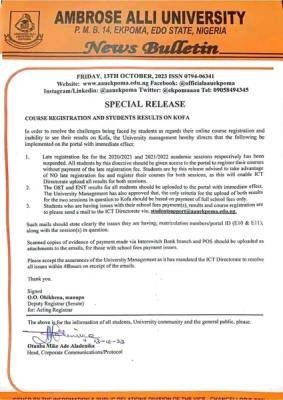
Graduate unemployment is no longer a Nigerian but a continental problem.
Vice-Chancellors, who gathered in Libreville, Gabon, for the 13th General Conference of the Association of African Universities (AAU), discussed the way out, reports KOFOWOROLA BELO-OSAGIE.
Who is to blame for graduate unemployment. This poser took vice-chancellors (VCs), deputy vice-chancellors (DVCs), other representatives of universities, governments, funding and research agencies four days to answer at the 13th General Conference of the Association of African Universities (AAU) held in Libreville, Gabon, last week.

Under the theme: Transforming African higher education for graduate employability and socio-economic development, the participants wondered whether the universities were at fault; whether their curricula were inappropriate. They also examined the government’s role in providing jobs and evolving policies that promote economic activities, which in turn, create jobs. They discussed the role of public/private partnership; and considered how graduates could be taught to become self employed.
Prof Bruno Bekolo Ebe, Recteur, University de Douala, Cameroon, said during one of the group discussions that he could not understand why doctors and engineers would be roaming without jobs when hospitals in his country lacked sufficient doctors. Was this a problem of the curriculum?
“I want to give examples and see if it is a problem of curricula. In my country, there is a shortage of doctors because we don’t train enough. Yet you find doctors without jobs. We also do not train enough engineers, pharmacists, nurses, but you find them roaming the streets,” he said.
In interviews with The Nation, many did not agree that the curricula in most African universities were inferior and responsible for producing graduates without relevant skills to survive in the labour market. Rather, they highlighted factors they said were responsible for graduates spending three to five years in the university but fail to get jobs after graduation.
These factors include dwindling spaces in the labour market due to poor economy, poor infrastructure, and preference for paid employment rather than creating jobs; politics and others.
Prof Arinola Sanya, DVC (Administration), University of Ibadan (UI), does not think the curriculum is a major problem. She said many African graduates who get an opportunity to travel abroad get competitive jobs and do well. She attributed the problem to politicization of employment by the government, such that only those with influence get available jobs.
She said: “Talking from my own experience at the UI, I will not say that our graduates are not good. When you conduct interviews, you find it difficult choosing the best out of the whole lot, because they are all very good. The problem is not with our curriculum. Of course, we need to review the curriculum regularly to accommodate changing trends. But I think the issue in Nigeria is that everything is politicized, including employment. So, it is not that our graduates are unemployable; but I think if you are not well connected, you will not get employed.
“I am of the feeling that the unemployment in Nigeria, the figure we are quoting, is not very accurate. It is true that a lot of ministries/parastatals have frozen appointments. That is publicly; but privately, jobs are given out to those who have the connection. And if you look properly, those ones have a previous job. They are just changing from one job to a better one. And that will not affect the percentage of the unemployed. Government should hands off politicizing everything.”
VC of Ajayi Crowther University in Oyo State Prof Timothy Jaiyeoba said the problem was now prominent because of the poor economy of most African states. He said industries were not doing as well as they used to do, thereby reducing job opportunities.
“In some places it is not as if the graduates are not good. It is just that the industries are not employing as many as they would have done in the past because of the economic situation. Many of them don’t produce at maximum level, some because of power situation. They use generator and so on so there is a limit to what they are producing. You see that they do not need these graduates fully. Most of these industries too import their products from abroad. Which means the employment of those who produce these goods are also outside Nigeria,” he said.
Sokoto State University VC, Prof Nuhu Yaqub, blames the government for the poor economy that has reduced the number of available jobs. The government had not helped businesses to thrive, he said because of poor infrastructure which increase the operating cost of businesses and makes them unprofitable. He added that non-diversification of the economy was also responsible for the problem.
He said: “There is also the incapacity of the state to provide infrastructure. There is what is now generally referred to as infrastructural deficiencies – no light, no roads, no water. Invariably this also has repercussions on productivity and employment. In fact, it has also led to a situation whereby you have a situation of underemployment.
Let me give you an example of myself. I wake up at midnight and I want to work on a paper to present for a conference and I discover there is no light. There is nothing I can do. I am employed; prepared to work; the facilities that will make me do my work to an optimal level are not there. So there is also the phenomenon of underemployment in most African states.
“So, I think, therefore, that when we are talking about how universities could be geared to produce graduates that would be employed, we have to take these factors into consideration. The nature of the African states, the nature of the economy the African states are also operating, and, of course, the other dimensions – the nature of governance itself – you discover that there is so much corruption in Africa.”
While many VC complained that government wasn’t doing enough, Great Zimbabwe University, VC Prof Rungano J. Zvobgo, blamed the universities for not preparing graduates for the job market. He said universities failed to be innovative with their curricula; university-industry linkages, and help students gain entrepreneurial skills to start businesses.
He said yearly, his university succeeds in getting 80 per cent of its students jobs even before graduation through its one-year job placement scheme. He advised the universities to prepare students to create jobs rather than seek employment.
“It is not enough for VCs to prepare students to graduate; they must also prepare students for the world of work. The public/private sectors don’t have sufficient jobs for all our students who graduate every year. What we have to do is to ensure that we have prepared our students with enough skills for them to be able to create employment for themselves and for others. And I gave the example of Zimbabwe where at my university, in the third year every student goes on what we call work-related learning.
“This is a year during which a student is engaged in a place of employment related to his or her programme. The purpose of this is that the student would begin to learn how to apply the knowledge he/she acquired in the classroom on the work bench in the relevant area of study. This is useful because it is true that the employer begins to identify your strength and weaknesses. And if the student shows sufficient capacity to translate what he/she learnt in the classroom on the work bench, it has happened that a number of students in that category gets offers of employment before they come back to the university for their final year. It is also useful because some of the students, particularly the good, hardworking ones, are able to demonstrate that university education is not all about getting a degree. It about how you are going to apply is that degree to go to the world outside for you to be able to survive.”
Prof Charles Nherera, VC, Women University in Africa, Zimbabwe, said attempts by VCs to blame government would be shooting themselves in the foot as they produce those who run the government.
“I want us to take the blame. I want us to think that employ-ability must expand to creating the employment ourselves. When we blame the government, politicians, infrastructure, we blame ourselves because we are the ones producing the people that create the problems,” he said.
He added that his university has also been able to achieve a high employment rate of its products because of partnership with the alumni who help with placements. He advised others to adopt this model.
“We have partnered with our alumni association in this regard. We inform them of students that need placement and they help fix them in places. As a result almost all our students get jobs shortly after graduation,” he said.
Though the university has a role to play in graduate employ-ability, VC of the University of Ghana, Legion, Prof Ernest Aryeetey submitted that university administrators are not to blame for all the problems in the system. He said there was a limit to what they could do from their offices in the universities.
“It will be a shame if VCs think we can solve all the problems of our countries. There are things we can do and cannot do. If there are no markets, the people we train cannot get jobs.
There are some responsibilities we can tackle. Our focus is on the curriculum. Every university has responsibilities to ensure the curriculum is relevant to the needs of the society,” he said.
How can universities get robust curricula for their programmes, it is by involving the stakeholders on the review of the curricula regularly, says Prof Ibrahim Kolo, VC, Ibrahim Badamasi Babangida University, Lapai, Niger State.
“We should state the difference between unemployment and unemployability. There is no way you cnat tie the question of unemployability to the curriculum. Every other person in the larger society should be concerned about this problem.
We should get stakeholders of university education – parents, corporate organizations, industry, to participate to put the infrastructure and curriculum we require to link our students with the industry in place,” he said.


